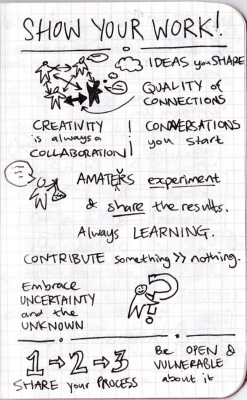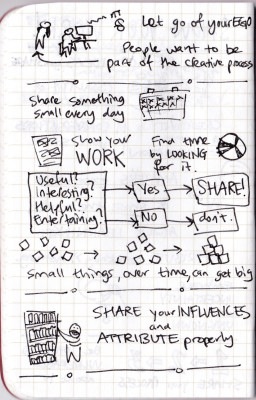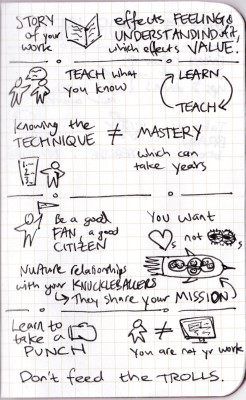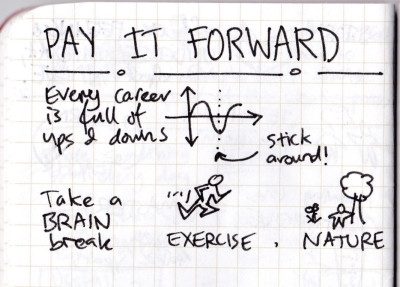Over the weekend I read Austin Kleon’s Show Your Work. The book is about getting discovered and self-promotion, but I picked it up with a more general vibe in mind. Skimming through the preview I was hoping I would get some nuggets of good advice by reading it, and I wasn’t disappointed.
The book is divided into ten sections:
- You don’t have to be a genius.
- Think process, not product.
- Share something small every day.
- Open up your cabinet of curiosities.
- Tell good stories.
- Teach what you know.
- Don’t turn into human spam.
- Learn to take a punch.
- Sell out.
- Stick around.
Early in the book, Austin talks about collaboration and connections, in the context of being part of a group. I really dig this because that’s how I feel about all the meetups and things I’m involved with (CTFEDs, SPIN, RailsBridge. I loathe the term “networking,” but I do really enjoy hanging out with smart people, and talking about interesting things.
Other themes in the book were things like honest, openness and vulnerability: humans like connecting with other humans.
I also enjoyed his discussion around sharing something small every day (even though I mostly fail at doing that!): over time, doing lots of little things can add up to a big thing.
Having recently read Sharon Bowman’s excellent Training From The Back Of The Room, I really liked the section in Mr Kleon’s book on teaching what you know. He talks about how, by teaching other people what you know, you learn things yourself.
Perhaps the biggest takeaway from the book for me was the section that explains why sharing your work won’t put you out of business: quite the opposite in fact. I’ve had many arguments with people about this before. I’ve mostly tried to talk about how there is plenty work to go around and that it’s on a continuum (my clients aren’t necessarily the same as your clients). I’ve also tried to talk about how keeping things secret doesn’t work. If your only value to the client is that secrecy, then your business won’t last long.
Mr Kleon talks about how knowing the technique is very different from mastery of it. The various activities of User Experience are an excellent example of this. Usability testing has very simple steps (or so it seems): find a person, watch them use a product, and take notes. Doing it well is another matter entirely: who do you find; what tasks do they do; what do you ask them (and what do you not); what things are important (and not); how do you interpret the results? That knowledge only comes with practice and mentorship.
I guess it’s not surprising that nowadays I find myself working on Open Source projects like Vumi and Universal Core.
One last thing I took away was to “find my knuckleballers” - the people who share my mission and principles. For me, that’s focusing on Progressive Enhancement. I want to always be mindful of the worst case scenarios and build things that will work on bad connections on hostile browsers. I want to build things that work when JavaScript fails to load, things that load fast and don’t cost the users lots of money.
It seems that there are very few people like that in Cape Town. Justin, Alex, and Rich are people whose work and principles I hold in high regard.



